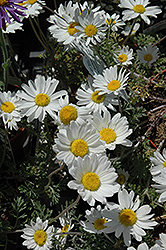Fri & Sat 8am - 8pm
Sun 8am - 7pm
Anytown, USA 12345
fax: 261.787.0463
e-mail: info@successgc.com


Plant Finder

Plant Height: 6 inches
Flower Height: 8 inches
Spread: 12 inches
Sunlight:
![]()
Hardiness Zone: 4a
Other Names: Mountain Dog Daisy, Carpathian Snow
Description:
Compact cushion, blanketed with an abundance of small white daisies, excellent for rock gardens; attractive finely cut leaves are fuzzy with a silvery blue-green coloration
Ornamental Features
Snow Carpet Marguerite Daisy is blanketed in stunning white daisy flowers with yellow eyes at the ends of the stems from mid spring to early summer. Its attractive tiny deeply cut ferny leaves remain grayish green in color throughout the season.
Landscape Attributes
Snow Carpet Marguerite Daisy is a dense herbaceous perennial with a ground-hugging habit of growth. It brings an extremely fine and delicate texture to the garden composition and should be used to full effect.
This plant will require occasional maintenance and upkeep, and is best cleaned up in early spring before it resumes active growth for the season. Deer don't particularly care for this plant and will usually leave it alone in favor of tastier treats. It has no significant negative characteristics.
Snow Carpet Marguerite Daisy is recommended for the following landscape applications;
- Mass Planting
- Rock/Alpine Gardens
- Border Edging
- General Garden Use
- Groundcover
- Naturalizing And Woodland Gardens
Planting & Growing
Snow Carpet Marguerite Daisy will grow to be only 6 inches tall at maturity extending to 8 inches tall with the flowers, with a spread of 12 inches. Its foliage tends to remain low and dense right to the ground. It grows at a medium rate, and under ideal conditions can be expected to live for approximately 5 years. As an herbaceous perennial, this plant will usually die back to the crown each winter, and will regrow from the base each spring. Be careful not to disturb the crown in late winter when it may not be readily seen!
This plant should only be grown in full sunlight. It does best in average to evenly moist conditions, but will not tolerate standing water. It is not particular as to soil type, but has a definite preference for acidic soils. It is somewhat tolerant of urban pollution. This particular variety is an interspecific hybrid. It can be propagated by division; however, as a cultivated variety, be aware that it may be subject to certain restrictions or prohibitions on propagation.
